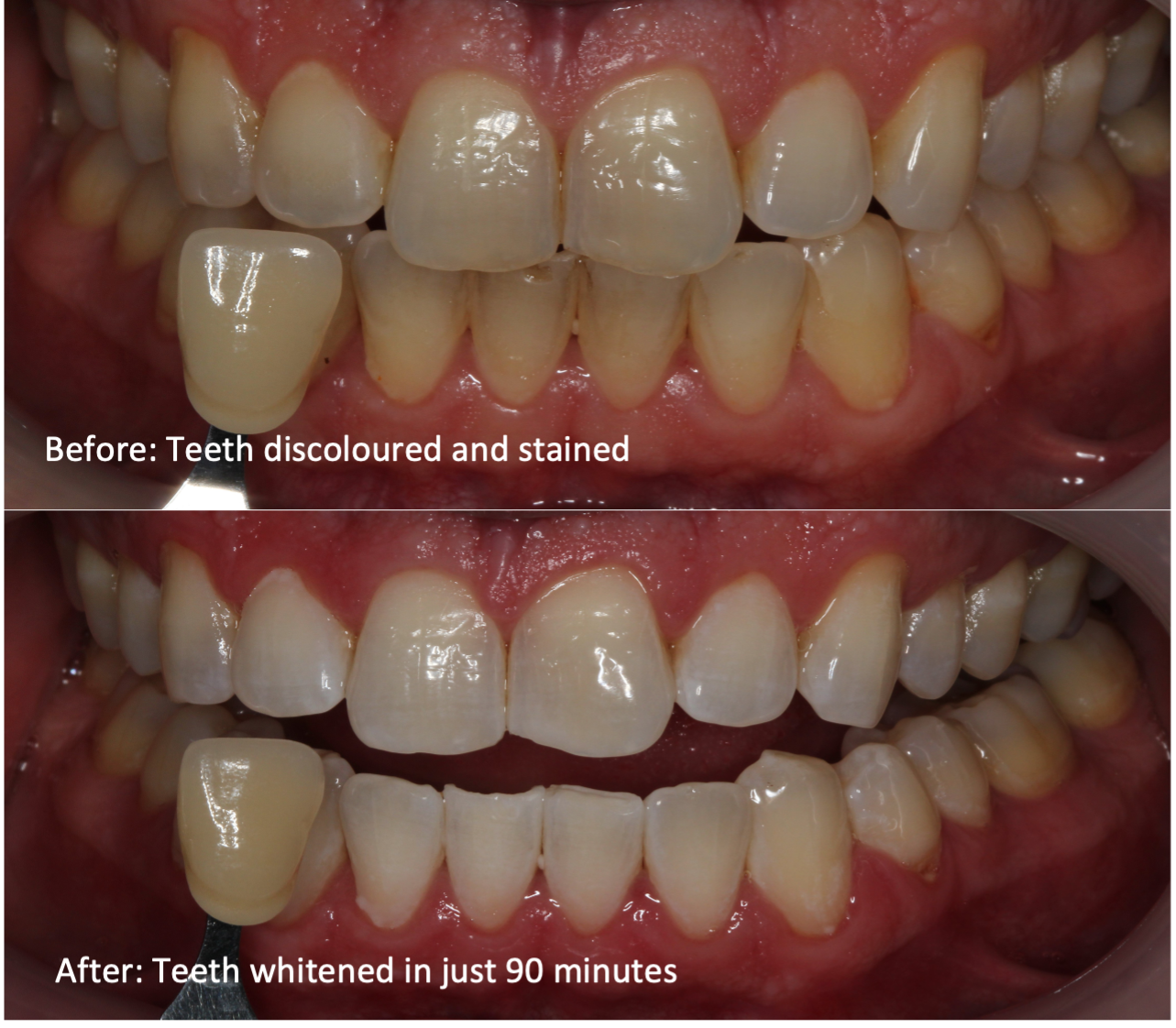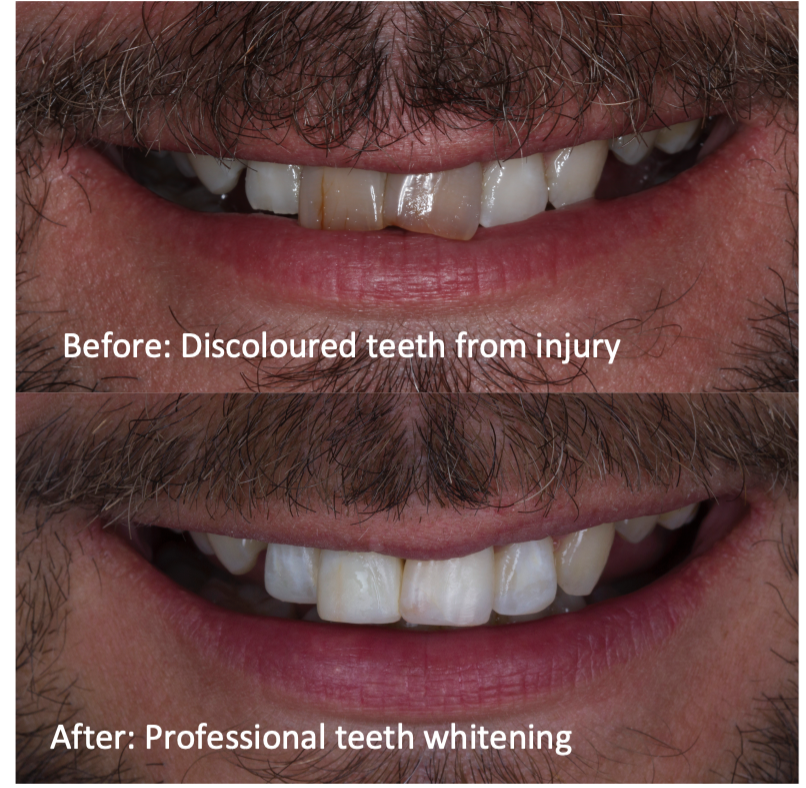Professional teeth whitening is a non-invasive way to improve the appearance of your smile and whiten teeth. Teeth whitening is safe and effective when carried out by a dental professional. Here we look at in-surgery and home whitening options. We will also discuss what professional teeth whitening option is best for you, and what types of whitening should you avoid. Dr Michael Orlans from Montagu Dental explains.
What are the steps for professional home whitening?
Many patients choose home bleaching as they can purchase extra whitening gels to further whiten the teeth, or maintain their new shade. The process typically takes several weeks, but can take up to 6 months in extreme cases if teeth are very yellow or have deep intrinsic staining caused by tetracycline.
The professional teeth whitening process generally involves these 4 steps unless it is a very complex case:
- Have an assessment with a dentist to ensure you are dentally fit to receive home whitening.
- Have a mould or scan taken of your teeth by your dentist.
- Custom trays are fitted for your teeth. A gel is placed inside the trays. You will wear the trays either overnight or for 60-90 minutes during the daytime.
- Continue until you are happy with the results! The time required for whitening depends on many factors but is typically 2-4 weeks.
How does professional in-surgery whitening work?
In-surgery bleaching consists of a 90-minute whitening session in the dental surgery. This will give your teeth an initial lift, but these results will need to be maintained with several days of home-bleaching afterwards. In-surgery bleaching is very popular for these reasons:
- It is a quicker fix than home whitening.
- You will give your teeth a head start before other whitening treatments, and home whitening can be used to maintain the new shade.
- Some patients do not have the manual dexterity for applying the home whitening option.
The photos below show in-surgery professional teeth whitening results carried out at Montagu Dental. To view our cosmetic dentistry smile makeovers, please click here.

The duration of the effect of professional tooth whitening varies depending on several factors, including the type of whitening, the patient’s oral hygiene habits, and the person’s diet and lifestyle.
When teeth are topped up with whitening treatments, tooth whitening can last indefinitely. Usually, patients choose to “top-up” their whitening after 1-2 years to maintain the shade they are happy with.
This doesn’t mean starting the process again, but simply buying a top-up whitening gel from your dentist (currently £20 at Montagu Dental).
Will tooth whitening damage my teeth?
Teeth whitening when carried out by a dental professional, and after a full assessment is very safe. Many patients will experience some sensitivity during the whitening process, but this is temporary and is not an indication that harm is coming to the teeth. Illegal and unregulated online products can cause severe damage to your teeth, and this is why you should always choose a professional teeth whitening option with a dentist.
Professional whitening vs. DIY methods
The active ingredients broadly used in professional tooth whitening (hydrogen peroxide and carbamide peroxide) are an effective and safe way to whiten your teeth. However, it is illegal for these to be sold by anyone other than a dentist, in quantities over 0.1%. This amount will have no effect on the whitening of teeth. Only dentists can safely and legally use quantities of up to 6% hydrogen peroxide and 16% carbamide peroxide for a professional whitening effect.
Because of the above, any products bought elsewhere will use alternative ingredients to whiten teeth. Common illegal products such as sodium chloride combined with citric acid erodes the tooth surface. Other products can be very abrasive to teeth. Teeth may appear whiter but ultimately can lead to thinner teeth which can eventually appear yellower.
Products bought online may be illegal and unregulated, and there are documented cases of severe damage caused by such products. Damage may be irreversible, and therefore is strongly unadvised – you only get one set of adult teeth!
Professional tooth whitening also requires a thorough assessment by a dentist, ensuring that your teeth are safe to be whitened, and to establish a diagnosis prior to whitening treatment. Sometimes discoloured teeth are discoloured for a reason such as a necrotic tooth, internal resorption, or developmental issues, which may need to be addressed prior to any whitening treatment or treated in a different way.
Does teeth whitening work on veneers, false teeth or fillings?
Teeth whitening will only work on natural teeth. Fillings, crowns, veneers, or dentures will not change colour. This means that if you have any of these visible, and if they are currently the same shade as your teeth – after whitening treatment your natural teeth will be whiter, and unnatural teeth may appear darker in contrast. If this is the case, you may wish to have these replaced after whitening treatment with a shade to match your new tooth colour.
Can all discoloured teeth be fixed with whitening?
Some very dark teeth may require root canal treatment, or advanced whitening whereby the tooth is whitened from the inside. This will be carefully assessed by your dentist and discussed with you before professional teeth whitening. Some very dark teeth may also require veneers, crowns, or composite bonding to mask the colour.
Complex staining such as blue-grey banded staining (from the antibiotic tetracycline), may require a teeth whitening course as long as 6 months.
We are still able to whiten teeth in these extreme cases. The picture below shows necrotic front teeth successfully treated with advanced professional whitening by Dr Michael Orlans.

How can I reduce and treat teeth staining?
Lifestyle factors such as smoking, consumption of dark-coloured drinks (such as coffee, tea, and red wine) and foods can cause teeth to yellow or discolour over time, so it’s essential to take proper care of your teeth and maintain good oral hygiene practices to help extend the duration of the whitening effect.
We are able to remove staining with a variety of methods. Extrinsic staining (stains on the outer surface of your teeth) can be removed with regular dental hygiene visits. Stubborn staining can be removed with airflow treatment, which blasts small particles at the teeth surface to leave them stain-free.
When is teeth whitening not advised?
Professional teeth whitening is illegal for children in the UK (under 18 years old) and should not be undertaken while pregnant or breastfeeding. It is also generally not advised for people with very sensitive teeth, as teeth whitening can increase dental sensitivity. However, special low concentration home whitening gels can be used for a longer duration in cases where teeth are very sensitive.
Will my teeth look ‘too white’ after professional whitening treatment?
Some celebrities you may have seen have teeth that look unnaturally white. This is because they are not natural teeth which have been whitened, but composite or porcelain veneers. Natural teeth always look better when whitened safely with professional teeth whitening treatments.
Professional Teeth Whitening at Montagu Dental.
We offer professional teeth whitening in-surgery or home bleaching kits. We love helping our patients to smile with confidence and to improve the aesthetics of their teeth. Contact us today to see how we can help you.

